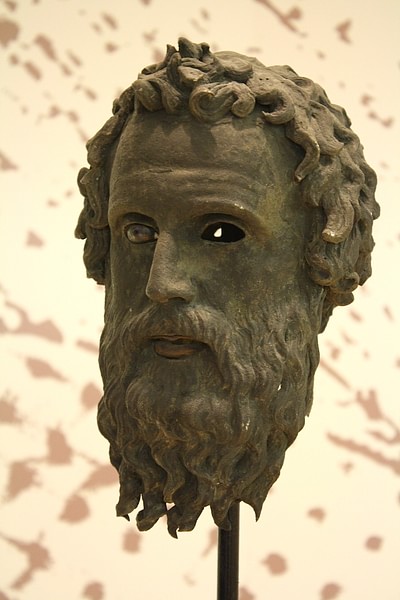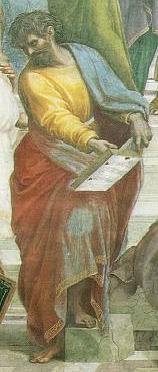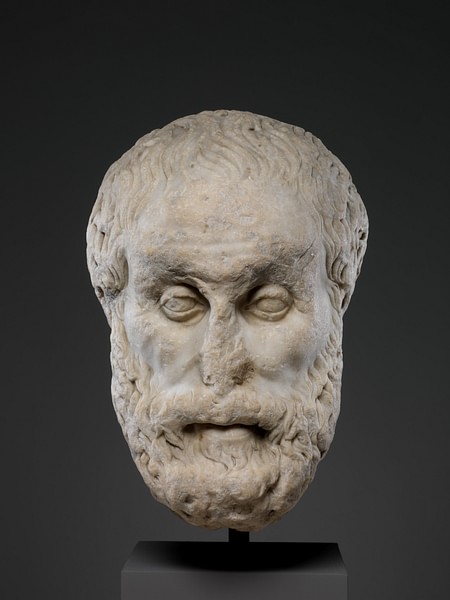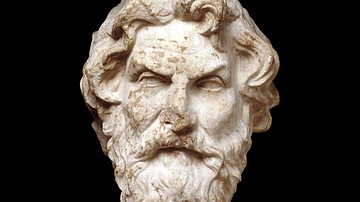Gorgias of Leontini (l. c. 427 BCE) was a famous Greek Sophist who claimed that nothing exists and, even if it does, its nature cannot be understood and, even if it could be, one is not able to communicate that understanding to another person. He makes these claims in his work On Nature, of which only a fragment exists today.
The fragment (also known as On the Non-Existent) is preserved in the works of the skeptical philosopher Sextus Empiricus (l. c. 160 - c. 210 CE) who identified with the philosophy of Pyrrho of Elis (l. c. 360 - c. 270 BCE), founder of the philosophical school of Pyrrhonism. Empiricus would have preserved Gorgias’ fragment because it supported the Pyrrhonist view that reality cannot be fully grasped, and that one became troubled in life by supposing it could be. Pyrrhonism advocated a healthy skepticism of all claims in order to maintain balance and peace of mind.
Gorgias’ fragment fits neatly into the Pyrrhonist vision as it denies the possibility of knowledge of objective existence and it is thought that the original work was written as a refutation of the philosopher Parmenides (l. c. 485 BCE) and his claim that existence could be understood as composed of a single unified substance because What-is cannot come from nothing nor from what it is not like and, therefore, What-is must have always existed. Gorgias argues that one cannot even claim existence exists, much less what it consists of.
It is also possible the work was simply a showpiece of rhetoric Gorgias used to attract clients by illustrating mastery of his craft in proving nothing exists even though one’s senses would indicate otherwise. If this is the case, the content could be considered meaningless in that the concepts are only used to display a mastery of persuasion and were not meant to be taken seriously. This interpretation is suggested by Gorgias’ other works in which he seems to clearly believe in objective reality and appeals to a common understanding of that reality to make his points. At the same time, however, the piece could be a sincere refutation of Parmenides while also displaying Gorgias’ skills of persuasion.
On Nature was more or less forgotten until interest in the work was revived by modern-day philosophers attracted by Gorgias’ claims regarding knowledge and how thought and speech relate to external reality. Since the mid-20th century, interest in the work has become more widespread owing to its vision of the human condition as consisting of separate realities which can never be fully communicated to others.
Refutation of Parmenides
The Pre-Socratic Philosophers (among whom both Parmenides and Gorgias are included) were primarily concerned with defining the First Cause of existence – recognizing the original “stuff” from which all else came – and a number of theories were suggested before Parmenides halted the inquiry by claiming a single substance for reality which was the totality of that reality. The First Cause question, he suggested, was the wrong question because that which now exists had always existed and would always exist; there was no beginning and there would be no end.
Parmenides’ work, like Gorgias’ and those of the others, only exists in fragments but there is enough of it to clarify his basic vision. He claimed, “There is a way which is and a way which is not” – the way of Truth and the way of opinion – and Truth, apprehended through reason (possibly what Gorgias means by “Pure Mind”), reveals the actual nature of Being:
Being has no coming-into-being and no destruction, for it is whole of limb, without motion, and without end. And it never was, nor will be, because it is now, a whole all together, one, continuous; for what creation of it will you look? How, whence sprung? Nor shall I allow you to speak or think of it as springing from Not-Being; for it is neither expressible nor thinkable that what-is-not is. Also, what necessity impelled it, if it did spring from nothing, to be produced later or earlier? Thus, it must be absolutely, or not at all. Nor will the force of credibility ever admit that anything should come into being, beside being itself, out of not-being…Thus, coming-into-being is quenched and destruction also into the unseen.
Nor is it divisible, since it is all alike. Nor is there anything there which could prevent it from holding together, nor any lesser thing, but all is full of being. Therefore, it is altogether continuous; for being is close to being…But it is motionless in the limits of mighty bonds, without beginning, without cease, since becoming and destruction have been driven very far away, and true conviction has rejected them…To think is the same as the thought that it is; for you will not find thinking without Being to which it refers. For nothing else either is or shall be except Being, since fate has tied it down to be a whole and motionless; therefore, all things that mortals have established, believing in their truth, are just a name: “becoming” and “perishing”, “being” and “not-being”, and change of position, and alteration of bright color. (Freeman, 43-44, fragment 8/Baird, 24-25)
Since all of Being is One, and all creatures participate in Being, motion and change had to be illusions created by sense perceptions. Trusting in one’s senses, one believed that a person could move from Point A to Point Z but, because both points were one, that movement was impossible. Parmenides’ claims were advanced by his student Zeno of Elea (l. c. 465 BCE) and, possibly, expanded by Melissus of Samos (l. c. 5th century BCE). The philosophers who followed Parmenides tried to reconcile his model with the day-to-day reality of motion and change but Gorgias seems to have dismissed it as nonsense in proving it was just as easy to show Being did not exist as that it had always existed and would continue to.
The Text
In the following fragment, Gorgias makes his case for non-existence and the impossibility of both comprehension and communication about anything whatsoever. The text is taken from Sextus Empiricus: Against the Professors edited by R.G. Bury, cross-referenced with Ancilla to the Pre-Socratic Philosophers by Kathleen Freeman and Philosophic Classics: Ancient Philosophy by Forrest E. Baird:
I. Nothing exists.
(a) Not-Being does not exist.
(b) Being does not exist.
i. As everlasting.
ii. As created.
iii. As both.
iv. As one.
v. As many.
(c) A mixture of Being and Non-Being does not exist.
II. If anything exists, it is incomprehensible.
III. If it is comprehensible, it is incommunicable.
I. Nothing exists. If anything exists, it must be either Being or Non-Being, or both Being and Not-Being.
(a) It cannot be Not-Being, for Not-Being does not exist; if it did, it would be at the same time Being and Not-Being, which is impossible.
(b) It cannot be Being, for Being does not exist. If Being exists, it must be either everlasting, or created, or both.
i. It cannot be everlasting; if it were, it would have no beginning, and therefore would be boundless; if it is boundless, then it has no position, for if it had position it would be contained in something, and so it would no longer be boundless, for that which contains is greater than that which is contained, and nothing is greater than the boundless. It cannot be contained by itself, for then the thing containing and the thing contained would be the same, and Being would become two things – both position and body – which is absurd. Hence, if Being is everlasting, it is boundless; if boundless, it has no position (“is nowhere”); if without position, it does not exist.
ii. Similarly, Being cannot be created; if it were, it must come from something, either Being or Not-Being, both of which are impossible.
iii. Similarly, Being cannot be both everlasting and created, since they are opposite. Therefore, Being does not exist.
iv. Being cannot be one, because if it exists it has size, and is therefore infinitely divisible; at least it is threefold, having length, breadth, and depth.
v. It cannot be many, because the many is made up of additional ones, so that since the one does not exist, the many do not exist either.
(c) A mixture of Being and Not-Being is impossible. Therefore, since Being does not exist, nothing exists.
II. If anything exists, it is incomprehensible. If the concepts of the mind are not realities, reality cannot be thought; if the thing thought is white, then white is thought about; if the thing thought is non-existent, then non-existence is thought about; this is equivalent to saying that “existence, reality, is not thought about, cannot be thought.” Many things thought about are not realities: we can conceive of a chariot running on the sea, or a winged man. Also, since things seen are the objects of sight, and things heard are the objects of hearing, and we accept as real things seen without their being heard, and vice versa; so we would have to accept things thought without their being seen or heard; but this would mean believing in things like the chariot racing on the sea. Therefore, reality is not the object of thought, and cannot be comprehended by it. Pure mind, as opposed to sense-perception, or even as an equally valid criterion, is a myth.
III. If anything is comprehensible, it is incommunicable. The things which exist are perceptibles: the objects of sight are apprehended by sight, the objects of hearing by hearing, and there is no interchange; so that these sense-perceptions cannot communicate with one another. Further, that with which we communicate is speech, and speech is not the same thing as the things that exist, the perceptibles; so that we communicate not the things which exist, but only speech; just as that which is seen cannot become that which is heard, so our speech cannot be equated with that which exists, since it is outside us. Further, speech is composed from the percepts which we receive from without, that is, from perceptibles; so that it is not speech which communicates perceptibles, but perceptibles which create speech. Further, speech can never exactly represent perceptibles, since it is different from them, and perceptibles are apprehended each by the one kind of organ, speech by another. Hence, since the objects of sight cannot be presented to any other organ but sight, and the different sense-organs cannot give their information to one another, similarly speech cannot give any information about perceptibles. Therefore, if anything exists and is comprehended, it is incommunicable. (Sextus Empiricus 1.3/Freeman, 128-129, fragment 3/Baird, 45-46)
Commentary
Parmenides claims that nothing can come from nothing and so, since something exists, it must always have existed and, that being so, will always continue to exist. Further, as it consists of a single nature, it is motionless, continuous, but held “in the limits of mighty bonds” which fix it in a given position. One arrives at this truth, Parmenides says, through reason since “to think is the same as the thought that it is” so, if one can conceive of reality as a single, continuous, whole, it must be so if one’s rational examination of that possibility confirms it.

Gorgias argues against this by showing how a reasonable set of propositions may be logically proven to arrive at a completely different conclusion. It is not only Gorgias’ words on the page that refute Parmenides, but his ability to apply reason to Parmenides’ model and come to a different conclusion, the very opposite conclusion, in fact. Instead of reason and logic proving a single reality which cannot be questioned, Gorgias shows how both can prove that reality is non-existent.
He begins by showing, using Parmenides’ claim regarding Being, that his reasoning is wrong because if Being/Reality is boundless, then it has no position and that which has no place to exist, cannot exist. If, as Parmenides claims, it is “held in limits” then it is not boundless because the “limit” would not only contain it but would have to be the stronger and, further, if all is one, that which limits would need to be of the same essential substance as what is limited so that limiter and limited would be one which Gorgias dismisses as an absurdity.
Just as importantly, however, even if Being did exist as Parmenides claims, it would be incomprehensible because, contrary to his assertion that thought is the same as what is thought of, Gorgias claims that thought is independent of objective reality. What one thinks of a desk is not the same thing as a desk and, further, one can think of things that do not exist – Gorgias gives the example of a chariot riding across the sea or a winged man – and so one can conclude that people can conceive of concepts that do not exist in objective reality.
Finally, Gorgias says, even if Being were comprehensible, it would not be communicable because each individual interprets reality in their own way (“speech is composed from the precepts which we receive from without”) and so what appears to be a desk to Person A might be a table to Person B or the image of “desk” in the mind of Person A might be significantly different from the “desk” of Person B. In order for Person A to accurately convey “desk” to Person B, they would need to know what “desk” meant to Person B, but this is impossible because of how Person A would interpret Person B’s description of a desk according to their own understanding of “desk”.
Conclusion
This same problem would be addressed over 2,000 years later by the relativist writer and philosopher Luigi Pirandello (1867 to 1936) who claimed reality was completely subjective and whatever one believed to be true, was true. Pirandello is most often cited as echoing the famous claim of Gorgias’ fellow sophist Protagoras (l. c. 485-415 BCE) that “man is the measure of all things” but is also touching on one of Gorgias’ central points in his work, notably in the passage on words and understanding from Six Characters in Search of an Author:
The whole problem lies here. In words, words. Each one of us has within him a whole world of things, each man of us his own special world. And how can we ever come to an understanding if I put in the words I utter the sense and value of things as I see them; while you who listen to me must inevitably translate them according to the conception of things each one of you has within himself. We think we understand each other, but we never really do. (Act I)
Since, according to Gorgias (and later Pirandello, among others), one’s interpretation of reality is subjective, no objective claim can be made by anyone that will be understood as intended by anyone else. Even a claim as simple as “this room is cold” can be challenged by someone else in the room who interprets it as being warm and so, Gorgias’ reasoning would go, if so simple a claim on room temperature can be disputed, how much more so any claim on the nature of reality?
Gorgias’ claims concerning the differences between thought and the object-thought-on, objective reality and subjective interpretation, and the difficulty in communicating individual impressions and truths, greatly appealed to the poets, writers, and philosophers of the 20th century who were trying to construct some working philosophy following the horrors of World War I and then World War II. Although Gorgias’ fragment was popularized by the German philosopher Hegel (1770 to 1831) and English scholar Grote (1794 to 1871), his concepts became more widely recognized later as various writers and thinkers started to agree with his conclusions.
The philosophical and religious models that were accepted prior to the World Wars were challenged by the unprecedented destruction, death, and abundant evidence of collective and individual atrocities committed. In the aftermath of both wars, the suggestion that each individual inhabited their own world, incommunicable to others (thereby rendering the concept of a shared reality or universal values impossible) began to make sense to many thinkers, informing aspects of Existentialism, and continuing to exert significant influence upon philosophers of various schools of thought in the present.







